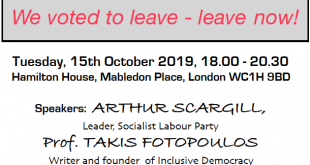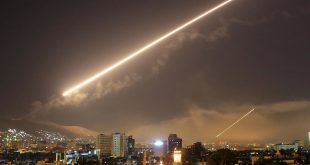We republish this interesting article by a Russian analyst who stresses the need for a Eurasian union based on nationally and economically sovereign countries, as an alternative pole to the New World Order of neoliberal globalization. In it, he tries to debunk the mass promoted –particularly by the “alternative” media and the Gulenists as well!– myth that the clearly West-backed coup was a staged “false flag” operation by Erdogan. This is a widely spread disorienting myth that was additionally exploded the last two days when revelations (that we accept with a proviso) came up about Turkey’s Intelligence knowing that a coup would take place in advance of its deployment, and informed the government just hours before its commencement on Friday night. Today, this was further established when an Iranian report claimed that the Russian Intelligence tipped Erdogan’s regime off about the oncoming coup. The author validly notes that the coup was strikingly expedited because of the sudden and possibly catalytic about-turn of Erdogan’s regime stance towards Russia and even Syria last month, a hypothesis which is now confirmed by the mass stripping of Turkey’s NATO-controlled army, the sacking and suspension of allegedly pro-Gulenists within the state machine, the direct threats by the US to kick Turkey out of NATO, the threats by the EU over the ongoing purges etc..
ANDRES KORYBKO
(28.07.2016)
The failed coup attempt against Erdogan provoked a flurry of excited polemics in the alternative informational space, leading to the emergence of two competing hypotheses. The author already published his own analysis on how this was actually a sloppy, last-ditch move by the US to frantically offset the game-changing geopolitical consequences of the surprise Russian-Turkish detente, but the other main theory that’s going around is that this was all a false flag attempt by Erdogan to seize more power.
The False Flag Theory
There are plenty of reasons why this is believable, not least of which is Erdogan’s involvement in other false flag plans such as the aborted 2014 mission to attack the Suleyman Shah tomb in northern Syria as a pretext for launching an all-out invasion. The Turkish strongman has also been implicated in the terrorist bombing campaign that broke out in the southern part of the country last summer and was eventually used as the grounds for relaunching hostilities against the Kurds.
Advocates of the “false flag coup” theory point to Erdogan’s immediate retribution against political opponents as alleged proof that he initiated his country’s regime change drama in order to give him a reason to carry out more purges and complete the Islamification of the constitutionally secular state. Actually, it was already widely known that the President had a long list of political enemies that he was progressively dealing with one by one, and that the Muslim Brotherhood-inspired Salafization of society had been gradually enabled through internationally recognized “democratic” means (however flawed and manipulated they may be). Erdogan didn’t need a “false flag coup” to continue with this years’-long and drawn-out agenda, though it did admittedly accelerate his plans.
In arguing against the “false flag coup” theory, it’s relevant to bear in mind that Erdogan is the consummate politician and never misses a chance to exploit a crisis to his benefit. After the re-establishment of his power in the wake of the failed coup, Erdogan saw an unprecedented moment to take out all of his enemies in one fell swoop, which is exactly what he’s in the process of doing right now. Still, this doesn’t necessarily prove that he wasn’t “in on it” all along.
A Reasonable Refinement Of The Theory
To entertain those allegations for a moment and add a bit more reasonable of an approach to them, it’s theoretically possible that Erdogan was in fact aware that a coup was actively being cooked up against him, but might have calculated that it’s better to let the weak and already compromised plan play out in order to crush it and then reap the opportunistic advantages. This would in a way resemble the situation around Pearl Harbor and some would even say 9/11, where the US knew that an attack was coming but had a deep-seated grand strategic interest in letting it happen regardless.
The author isn’t necessarily endorsing this approach when it comes to Turkey, and it seems too overly risky of a gamble even for Erdogan (who has a history of such reckless behavior), but going along with this theory for a moment, it’s conceivable that he could have even been tipped off by Russian intelligence about what was going to happen. Moscow could have offered up the details of this plan as a trust-building gesture in the run-up to the game-changing Russian-Turkish detente, and also because Russia didn’t want the US and its informational allies to lay the blame at its feet if it failed.
Erdogan, uncontrollably enraged at the US for trying to orchestrate his humiliating future downfall on live TV, might then have committed to his country’s gradual Eurasian reorientation, but knew that he would need publicly justifiable grounds for doing so, ergo allowing the compromised American plan to proceed so that he can squash it right afterwards and use it to explain his country’s foreign policy pivot.
Actions Speak Louder Than Speculation
Anyhow, whether Erdogan was caught completely unaware by the coup or decided in advance to capitalize off of it, the sequence of events that has played out in its aftermath offers convincing proof that the forcible regime change attempt was directed by the US.
Turkish Labor Minister Suleyman Soylu came out and said as much, but Prime Minister Binali Yildirim was more diplomatic when he said about Gulen that “I do not see any country that would stand behind this man, this leader of the terrorist gang, especially after last night. The country that would stand behind this man is no friend to Turkey. It would even be a hostile act against Turkey.” The concurrent de-facto neutralization of the US airbase in Incirlik through the imposition of a no-fly zone (though not formally stated as such), the cutting off of power to all of its facilities, and the arrest of its commander General Bekir Ercan Van on the base’s premises for his coup involvement all very strongly suggest that this isn’t just a stage-crafted melodramatic power grab by Erdogan, but the opening stages of a serious geopolitical reorientation away from the US.
Whether the US remains in Incirlik or not is actually a moot point, since the profound symbolism around what’s unfolding is much more substantial than the Pentagon’s physical presence there. Never before in history has the US been cut off from its own nuclear weapons, which is essentially what’s happened with the no-fly zone and power shutoff to Incirlik. Erdogan is trying to convey in the most memorable and impactful way possible that he is the Sultan over all of Turkey — including Incirlik — and that he will not tolerate having the facility used against him for actively aiding and sheltering coup plotters. In response to this unthinkable disrespect from a former quisling, the US is now preparing a vicious Hybrid War offensive against Erdogan, one which might even escalate to the level of geopolitically dismembering Turkey and throwing the more than 70 million people who inhabit the Neo-Ottoman “caliphate” into a cauldron of chaos that could then be strategically redirected against Russia and Iran.
Weaponizing The Turkish Battlespace Against Russia And Iran
Both of these multipolar states have been well aware of how the US wants to destabilize them vis-a-vis the promulgation of Mideast mayhem, and this fundamentally explains their anti-terrorist military cooperation in Syria. With the tide of that war having finally turned against the US and the conflict slowly drawing to a close (however long it may ultimately take to fully resolve), it’s foreseeable that the US will seek to manufacture other regional conflicts to take its place and prolong the indirect asymmetrical war against Russian and Iranian grand strategic interests. The militant creation of the “second geopolitical Israel” of “Kurdistan” is definitely part of these plans, but with Erdogan’s anti-unipolar rebellion and the subsequent fallout from the failed US-directed coup, Washington now has a host of reasons for exploiting the myriad opportunities to tear Turkey apart.
Russia and Iran both understand the severity of what’s at stake, and it’s very likely that the US will seek to transition it’s failed coup attempt against Erdogan into the seeds for a new Color Revolution against him and perhaps possibly even an Unconventional War. There are plenty of legitimate reasons why Turks despise their President, with his Lead From Behind involvement in the War on Syria and Salafist domestic policies being first and foremost among them, but the fear is that the justifiable anger of a large segment of society can be exploited by the US in its quest to spread turmoil around Turkey and create a black hole of chaos that would structurally function as a “New Syria”.
Iran’s Response And Interests
Foreseeing this chain of events and realizing that it would be the first to be directly affected by it, Iran immediately voiced its opposition to the coup attempt. Foreign Minister Zarif, in comments reported on by publicly financed Iranian broadcaster Press TV, even went as far as telling parliament that “We were the first country that explicitly declared our position regarding Turkey, while other countries either kept mum or…were vague in their stance, if they adopted any, and failed to voice their support for democracy…Some countries such as Saudi Arabia and Qatar preferred the escalation of the attempted coup against the Turkish government.” This full-throated and powerfully worded statement goes way beyond mechanically voicing support for the internationally recognized government like mostly everybody else has been doing and inarguably demonstrates that Tehran is intentionally positioning itself as Ankara’s closest international ally in the post-coup regional landscape.
The reasons for this are several and have to do with the following:
* not wanting to be victimized by Weapons of Mass Migration in the aftermath of the country’s US-planned destruction;
* wanting Erdogan’s sustained and coordinated cooperation in responding to the potential for cross-border Kurdish terrorism (Iran is presently under attack by the PKK-allied “Kurdish Democratic Party of Iran”);
* and envisioning that an Iranian gas pipeline could one day connect to the TAP project in northern Turkey and satisfy Europe’s demands for non-Russian energy supplies.
Russia’s Response And Interests
Russia’s anti-coup response was more muted by comparison, but was still nonetheless pretty strong. Refraining from accusing any actor of wanting to profit from the latest events and staying away from emphasizing just how quickly it diplomatically responded to the coup like Iran did in both instances, Russia simply expressed its support for Turkey’s internationally recognized government and spoke about the impermissibility of militant regime change. Tellingly, though, President Putin later called Erdogan and agreed to push forward their planned September meeting for next month, as well as discuss potential cooperation via the Eurasian Economic Union.
Russia’s interests in Turkey are manifold, but a few stand out more than the rest and aim to ensure that Ankara completes its geopolitical reorientation by taking the following steps:
* disown its former policies by cutting off support for terrorists in Syria and sealing off the border from continued terrorist infiltration;
* restart the Balkan Stream pipeline negotiations and unfreeze this pivotal multipolar megaproject;
* and deepen the complex economic interdependence with Russia by cooperating with it through the Eurasian Economic Union platform.
Additionally, Moscow’s diplomatic support for Erdogan’s presidency is also driven by the pragmatic need to prevent the Gulenists from seizing power. If the US-based and Clinton-connected religious leader of this shadowy transnational network were to become Turkey’s next leader or had controlling influence over whichever of his proxies ends up doing so instead, then Russia has every reason to believe that they’d redirect all state instruments to promoting the network’s terrorist agenda in the entire post-Soviet territory. This could create dozens of “mini-Chechnyas” for Russia to respond to on behalf of its CSTO allies, thus putting it permanently on the strategic defensive and reversing all the relative gains that it’s achieved worldwide since 2008.
Turning An Eye Away From Erdogan’s Sins
The most controversial aspect of this entire affair that many multipolar supporters have difficulty accepting is why Russia and Iran would support Turkey despite being totally aware of Erdogan’s complicity in the War of Terror on Syria. Furthermore, after seeing images of retributive mob violence in Istanbul and at least one verified public beheading, to say nothing of the cross-sectoral nationwide purge that’s going on right now, people that are otherwise sympathetic to Russia and Iran’s foreign policies are scratching their heads and wondering why Moscow and Tehran aren’t determinately speaking out against such shocking events.
In reality, and as much as it may disappointment many readers, the harsh fact is that neither Russia nor Iran have any interest in their partners’ domestic affairs, whether for right or for wrong. Each state generally pursues a policy of state sovereignty whereby they ignore oftentimes controversial developments within their partners’ countries so long as pragmatic state-to-state cooperation isn’t impeded as a result.
The exception to this rule is mostly seen whenever a state of paramount interest to Russia or Iran suddenly becomes, or already has been, hostile to either of them and embarks on a series of scandalous domestic steps designed to indirectly damage these multipolar leaders’ strategic positions within the country. For example, post-Maidan Kiev implicitly supported the ethnic cleansing of the Russian and Russian-affiliated population in Ukraine, thus explaining why Moscow responded in Crimea and extended certain forms of support to the Donbas militias.
Iran, on the other hand, has responded negatively to Bahrain and Saudi Arabia’s violent suppression of their Shiite minorities. It should be qualified, though, that Tehran has also previously engaged in less-justified exceptions to this rule by arming the Bosnian mujahideen and diplomatically backing the anti-Gaddafi fighters that it officially proclaimed were involved in an “Islamic Awakening” (the term that it employed for the “Arab Spring” Color Revolutions prior to realizing that they were all American-directed unipolar operations).
In spite of the case-by-case exceptions that Russia and Iran take to their cardinal foreign policy guideline of supporting state sovereignty, both of these countries still reject the Western-crafted ideologies of “humanitarian intervention” and “democracy promotion”. Neither of these counties typically let “humanitarian” or “democratic” considerations influence their relations with their counterparts, though like it was already stated, this doesn’t necessarily hold true when dealing with hostile governments that have shunned pragmatic partnership (whether existing or potential). Moscow and Tehran see “humanitarian intervention” and “democracy promotion” as marketing gimmicks for “justifying” destabilizing political, economic, social, and military interventions into other countries’ domestic affairs for the pursuit of “zero-sum” geostrategic gains, and as such, these stratagems should only be used sparingly and in the most extreme of circumstances.
Concluding Thoughts
Due to the guiding foreign policy principle of state sovereignty, the fact that Erdogan has pivoted in moving Turkey closer to becoming a friendly multipolar ally, and because of the bigger geopolitical considerations at stake at the moment, Russia and Iran diplomatically support Turkey at this pivotal moment in its (and the rest of the world’s) history in spite of Erdogan’s anti-“humanitarian” and anti-“democratic” exploitation of the failed US coup against him.
source: Geopolitica.ru
 ANTIGLOBALIZATION – SELF-RELIANCE – INCLUSIVE DEMOCRACY Building Popular Fronts for National and Social Liberation (FNSL): for a Democratic Community of Sovereign Nations towards an Inclusive Democracy
ANTIGLOBALIZATION – SELF-RELIANCE – INCLUSIVE DEMOCRACY Building Popular Fronts for National and Social Liberation (FNSL): for a Democratic Community of Sovereign Nations towards an Inclusive Democracy







